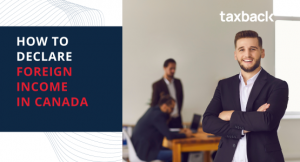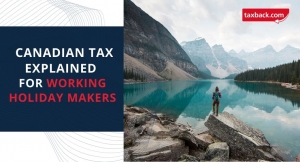How to calculate your tax refund in Canada
Are you among those who have experienced or are currently enjoying a working holiday in Canada?
Many working holidaymakers are unaware that, at the end of the tax year, they could be due a substantial tax refund from their time in Canada.
In short, if you paid too much income tax, which a lot of nonresidents in Canada do, you may be owed tax back.
Knowing how much tax refund you will get in Canada is key.
What will be covered?
- What is a tax refund?
- How much did I earn in the year?
- How to calculate a Canadian tax refund
- How much will tax refund will I get in Canada?
- Case studies
In this guide, we'll share everything you need to know about Canadian tax, from tax returns to credits you can avail of, including how much tax refund you will get in Canada!
What is a tax refund?
A tax refund, also known as a tax rebate, is a reimbursement to a taxpayer where they have paid too much tax during the year.
There are lots of reasons why you may be due tax back during your stay in Canada and the average Canadian tax refund from Taxback is $998!
A fast and easy way to find out if you are due a tax refund is by availing of Taxback's handy online Canada tax calculator.
The average Canadian tax refund is $998
How much did I earn and how can I work out my total income for the year?
The best way to find out "how much tax refund will I get in Canada" is through your T4 form.
Officially known as "T4 Statement of Remuneration Paid", this form is filed along with your tax return and is essentially a summary of the income that you earned and the tax that you paid in a particular tax year.
If you had multiple jobs in Canada during the year then you will receive multiple T4 forms.
If you are looking for tax to be refunded the following will apply to you – Boxes 22, 16 and 18.
Usually, if you earned under the tax-free allowance for the tax year ($15,705 in 2024 or $15,000 in 2023) then you will be entitled to be refunded the majority if not all of your income tax.

How to calculate a Canadian tax refund
There are numerous ways to find out how to check your tax refund in Canada and determine if you are due a refund.
For example, you could lodge your tax return with the Canadian Revenue Agency (CRA). Once you file the necessary paperwork, the CRA will reach out to you and inform you if you have paid too much tax and are due a refund.
There are also ways to calculate an approximate refund by yourself.
For example, you could use a tax return calculator for Canada, such as Taxback's handy online tool. This calculator allows you to input your income, tax paid, and other relevant details to estimate your potential refund.
You can do this by determining:
- How much income you earned during the Canadian tax year
- If you're entitled to the Canadian tax-free allowance
- Your rate of Canadian income tax
- Your entitlement to any tax deductions in Canada
Once you find out these figures, you can tally up what you should have paid in tax and compare it to what you did pay. This comparison will help you accurately calculate your tax refund in Canada.
For some, this can be a daunting prospect...
That's why Taxback is here to help you!
When you apply for a Canadian tax refund with us, all you'll need to do is complete a few short questions, sit back, and wait for us to get your money!
We'll claim all of the tax expenses (including medical bills, tuition fees and travel) that you are owed in order to boost your tax refund, all the while ensuring you are fully tax-compliant in Canada.
Ready to claim a tax refund from Canada?
How much tax refund will I get in Canada?
Put simply - it depends!
Every person who lived and worked in Canada has different circumstances that affect their potential refund amount, such as how much they earned and how much tax they paid.
There are some factors you should take into consideration in order to properly calculate how much tax refund you will get in Canada.
Expenses
Earning over the tax-free allowance can allow you to claim on the cost of certain expenses to reduce how much tax you pay.
However, you will need to ensure you save receipts as proof of your expenses.

Medical Expenses
You will be able to claim these for yourself, your spouse/ common-law partner, as well as certain related persons.
Examples of expenses you can claim when filing include:
- Doctor consultants
- Nurses' fees
- Prescription drugs/medications
- Premiums paid to private health insurance
- Costs related to purchase of gluten-free food for coeliac
- Orthodontic work
These can all make a difference when you are calculating your tax refund amount.
Moving Expenses
If you move from one location to another in Canada, you may be able to claim moving expenses on that tax year's return.
In order to qualify, you'll need to have started a job at your new location and the new place must be at least 40km closer to your employment.
You can also claim these if you moved for post-secondary education in Canada.
Ready to claim a tax refund from Canada?
Tuition expenses
If you study in Canada, you may be eligible to claim tuition expenses on your student tax return.
A course usually qualifies for this if it was taken at the post-secondary level or (for persons 16 years of age or older at the end of the year) if it is used to add skills in a job and the course is certified by the Employment and Social Development Canada.
You must also have taken the course in the tax year you are filing for.
Once you pay your tuition, you should receive a Form T2202 (Tuition and Enrolment Certificate) from the institution where your course is, which you will fill out in order to calculate your eligible tuition fee credit.

Personal Tax Credits
In Canada, the tax-free allowance (also known as personal tax credit) allows an individual to earn up to $15,705 in 2024 without paying any tax on their income.
To find out if you are eligible for personal tax credits you'll need to complete a Form TD1. This will be filled in when you are starting a new job in the country.
However, many working holidaymakers cannot claim personal tax credits if they earned income outside of Canada in the tax year.
This is called the "90%" rule - more on this shortly.
By claiming the credit twice, you may end up with an increased tax liability, meaning you will owe taxes to the CRA come tax season.
The 90% rule
Broken down, the 90% rule essentially means that if you earned more than 10% (net) of your income outside of Canada within the tax year, you can't avail of personal tax credits.
If you did earn 90% of your income within Canada, however, then you can claim the credits.
This should be taken into consideration when completing your TD1 form.
If you didn't earn 90% of your income in Canada for that year then all you need to do is enter 0 in box 13 and then enter 'No' on the non-resident question on the form.
Case studies
Mark
In August 2023, Mark moved from his home in Dublin to Whistler.
Before he moved to Canada, he worked in Dublin between January – July 2023 and earned €1,700 ($2,720) per month. Mark got a job in Whistler which began in October 2023.
Here, he earned $2,500 per month until the end of the year.
Mark cannot claim the personal tax credits as he earned over 90% of his income outside of Canada.
Jenny
Jenny worked in Dublin and earned €2,000 ($3,200) per month before she moved to Vancouver in February 2023.
In March 2023 she started employment in a different company in Canada, earning $3,300 per month until the end of the year. Her total income for 2023 was $36,200. She earned $33,000 (or 91%) of this income in Canada.
With this in mind, Jenny can claim the tax credit as over 90% of her income is in Canada.
How long does it take to get my Canadian tax back?
The CRA will usually process your tax refund within two weeks of you filing an online tax return, or eight weeks if you file by paper.
However, if you live outside of Canada, these may take as long as 16 weeks. This is especially true if your tax return is flagged for review by the CRA.

Who can help me claim my Canadian tax back?
Taxback!
We've been specializing in Canadian tax refunds for over 25 years - safe to say we know the ins and outs of Canadian tax filing!
Our most frequently asked question is "how much tax refund will I get in Canada", which is why we have Our Canadian tax refund estimator, it is free to use and provides you with an estimate of how much tax refund you will get in Canada once you file your taxes.
To complete the calculator, all you will need to know is:
- The tax year you wish to apply for
- Your Visa Type
- Your total income
- How much tax you pay (you can find this information on your PAYG Form or final payslip)
- Your contact details
- Then, if you're happy with what you see, you can proceed and claim your tax back!
Ready to start your application?
Kick off your Canadian tax refund application TODAY!




